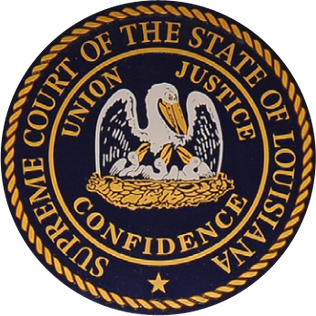
There have been 90 gubernatorial elections in the state of New York since 1777. The next one will be held on November 3, 2022.

The Louisiana State Legislature is the state legislature of the U.S. state of Louisiana. It is a bicameral body, comprising the lower house, the Louisiana House of Representatives with 105 representatives, and the upper house, the Louisiana Senate with 39 senators. Members of both houses are elected from single-member constituencies.
Louis St. Martin was an American politician from Louisiana.

The Supreme Court of Louisiana is the highest court and court of last resort in the U.S. state of Louisiana. The modern Supreme Court, composed of seven justices, meets in the French Quarter of New Orleans.

The Louisiana State Senate is the upper house of the state legislature of Louisiana. All senators serve four-year terms and are assigned multiple committees to work on. The current Senate President John Alario from Westwego.

Louisiana Constitutional Amendment 1 of 2004, is an amendment to the Louisiana Constitution that makes it unconstitutional for the state to recognize or perform same-sex marriages or civil unions. The referendum was approved by 78% of the voters.

The Office of Lieutenant Governor of Louisiana is the second highest state office in Louisiana. The current lieutenant governor is Billy Nungesser, a Republican.
The following table indicates the party of elected officials in the U.S. state of Louisiana:

The Secretary of State of Louisiana is one of the elected constitutional officers of the U.S. state of Louisiana and serves as the head of the Louisiana Department of State. The position was created by Article 4, Section 7 of the Louisiana Constitution.

United States gubernatorial elections were held in three states.

The Louisiana gubernatorial election, 1842, was the ninth gubernatorial election to take place after Louisiana achieved statehood. Under Article III Sec 2 of the 1812 Constitution of the State of Louisiana the Governor was elected in two steps. On the first Monday in July, eligible voters went to the polls and voted. The returns were sent to the President of the Louisiana State Senate. On the second day of the session of the Louisiana State Legislature, the Louisiana House of Representatives and Senate met in joint session and voted between the top two candidates. The candidate who received a majority in General Assembly became governor. This was the last election held under the Constitution of 1812, the next election was held under the Constitution of 1845.

The Louisiana gubernatorial election, 1846, was the first of two elections to take place under the Louisiana Constitution of 1845. The new constitution abolished the provision in the 1812 constitution that required a gubernatorial candidate to win a vote of the legislature to get elected, leaving the final decision up to the people. The new constitution also cut incumbent Governor Alexandre Mouton's term short by one year thus moving the election from July 1846 to January 1846 with the inauguration of the new governor in February.

The Louisiana gubernatorial election, 1849, was the last of two elections to take place under the Louisiana Constitution of 1845. The new constitution abolished the provision in the 1812 constitution that required a gubernatorial candidate to win a vote of the legislature to get elected, leaving the final decision up to the people. The new constitution also cut incumbent Governor Alexandre Mouton's term short by one year thus moving the election from July 1846 to January 1846 with the inauguration of the new governor in February.

The Louisiana gubernatorial election, 1855, was the second election to take place under the Louisiana Constitution of 1852. As a result of this election Robert C. Wickliffe became Governor of Louisiana.

The Louisiana gubernatorial election, 1859, was the third election to take place under the Louisiana Constitution of 1852. As a result of this election Thomas Overton Moore became Governor of Louisiana. This was the last Louisiana gubernatorial election before the outbreak of the Civil War.

The Louisiana gubernatorial election, 1859, was the fourth election to take place under the Louisiana Constitution of 1852. As a result of this election Henry Watkins Allen became Governor of Confederate-controlled Louisiana.







